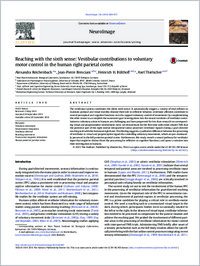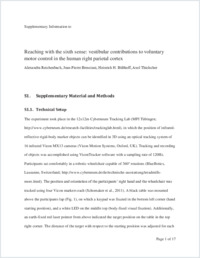Reaching with the sixth sense: Vestibular contributions to voluntary motor control in the human right parietal cortex
- Reichenbach, Alexandra Max Planck Institute for Biological Cybernetics, Tübingen, Germany
- Bresciani, Jean-Pierre Max Planck Institute for Biological Cybernetics, Tübingen, Germany - Laboratoire de Psychologie et NeuroCognition, University of Grenoble, France - Department of Medicine, University of Fribourg, Switzerland
- Bülthoff, Heinrich H. Max Planck Institute for Biological Cybernetics, Tübingen, Germany - Dept. of Brain and Cognitive Engineering, Korea University, Republic of Korea
- Thielscher, Axel Max Planck Institute for Biological Cybernetics, Tübingen, Germany - Danish Research Center for Magnetic Resonance, Copenhagen University Hospital, Hvidovre, Denmark - Biomedical Engineering Section, Technical University of Denmark, Lyngby, Denmark
-
01.01.2016
Published in:
- NeuroImage. - 2016, vol. 124, Part A, p. 869–875
Voluntary movement
Sensorimotor integration
Vestibular afferent
Reaching movement
Transcranial magnetic stimulation
Human posterior parietal cortex
English
The vestibular system constitutes the silent sixth sense: It automatically triggers a variety of vital reflexes to maintain postural and visual stability. Beyond their role in reflexive behavior, vestibular afferents contribute to several perceptual and cognitive functions and also support voluntary control of movements by complementing the other senses to accomplish the movement goal. Investigations into the neural correlates of vestibular contribution to voluntary action in humans are challenging and have progressed far less than research on corresponding visual and proprioceptive involvement. Here, we demonstrate for the first time with event-related TMS that the posterior part of the right medial intraparietal sulcus processes vestibular signals during a goal-directed reaching task with the dominant right hand. This finding suggests a qualitative difference between the processing of vestibular vs. visual and proprioceptive signals for controlling voluntary movements, which are pre-dominantly processed in the left posterior parietal cortex. Furthermore, this study reveals a neural pathway for vestibular input that might be distinct from the processing for reflexive or cognitive functions, and opens a window into their investigation in humans.
- Faculty
- Faculté des sciences et de médecine
- Department
- Département de Médecine
- Language
-
- English
- Classification
- Biological sciences
- License
-
License undefined
- Identifiers
-
- RERO DOC 258900
- DOI 10.1016/j.neuroimage.2015.09.043
- Persistent URL
- https://folia.unifr.ch/unifr/documents/304842
Other files
Statistics
Document views: 104
File downloads:
- pdf: 166
- Supplementary material: 165

